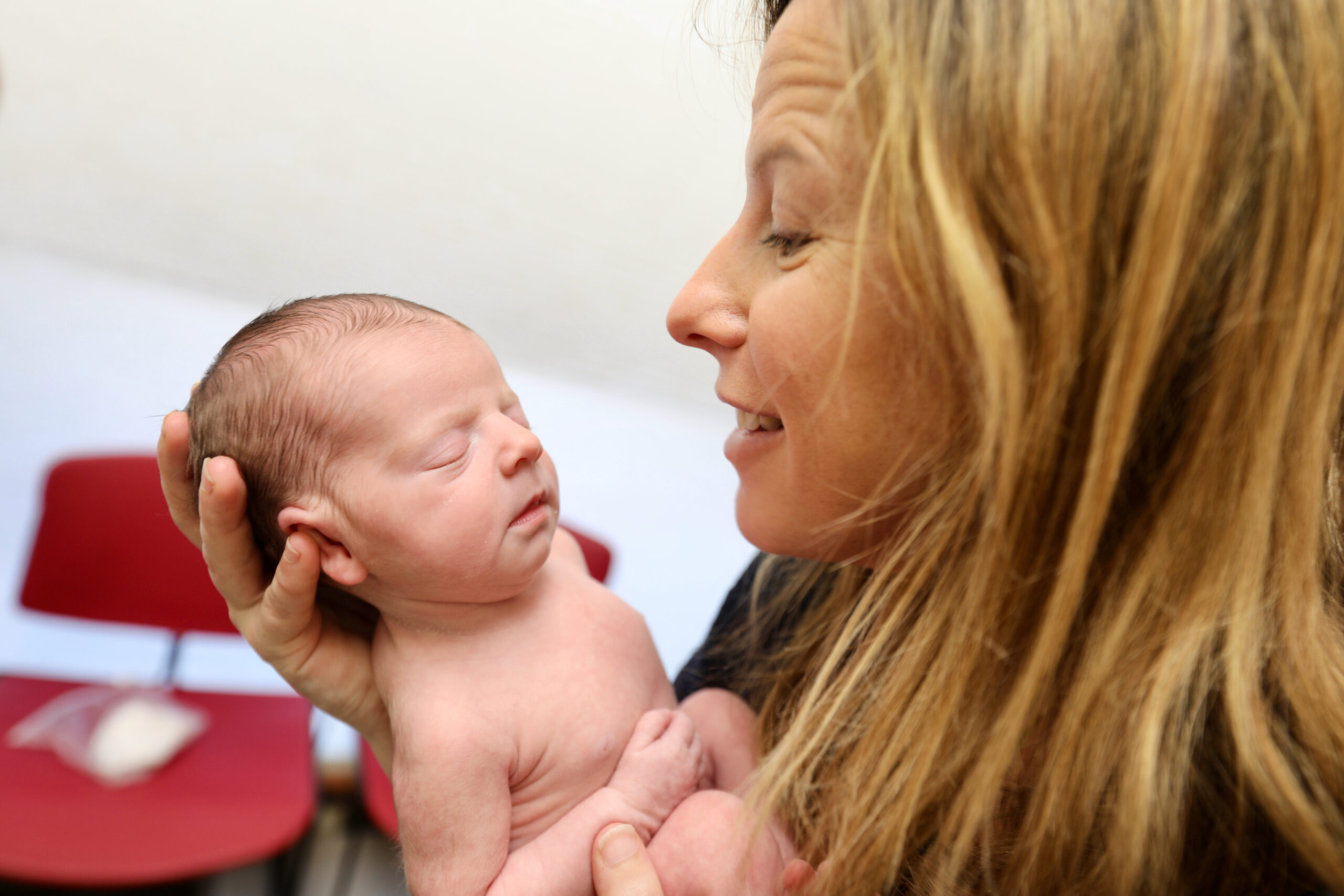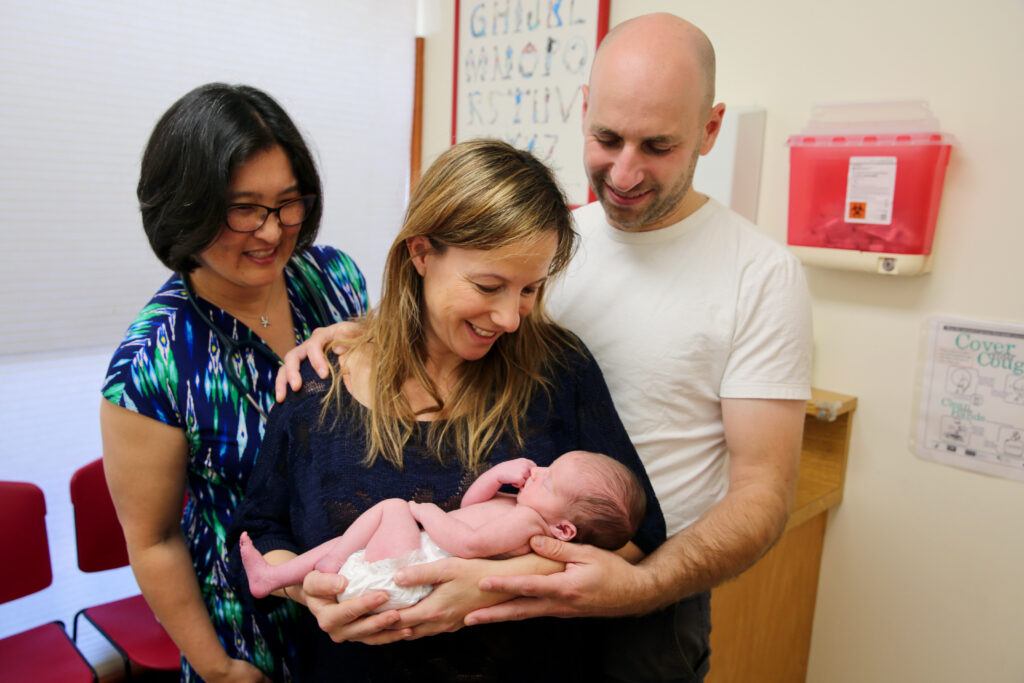What pregnancy taught me about behavioural science
Pre-natal and beyond: a few behavioural insights for improving healthcare
Pre-natal and beyond: a few behavioural insights for improving healthcare
 Photo: Courtesy of Kristen Berman
Photo: Courtesy of Kristen Berman
I’m a behavioural scientist. And a very new mother. Pregnancy was a wild experience for me – but not only for the reasons most people experience. It was a minefield of behavioural insights.
A little background: I’m the co-founder of Irrational Labs, a behavioural science design and consulting firm. Over the last decade, we have worked with hundreds of teams from tech companies such as Google, Microsoft and LinkedIn and US healthcare companies such as Anthem, Talkspace and Livongo. Using behavioural science, our team has seen incredible results – we have increased access to telehealth, decreased shares of misinformation on TikTok and decreased consumer defaults on auto loans.
“While I have all this experience of applying behavioural insights in the real world, it was my own pregnancy experience that hit me with new insights.”
While I have all this experience of applying behavioural insights in the real world, it was my own pregnancy experience that hit me with new insights into how to get people to take their medicine, how to communicate with patients, and some small ways that we as a society can drive better health outcomes.
Nonadherence – that is, forgetting doses of medication that doctors have prescribed, or not
completing the course – is a major problem: it could account for up to 50% of treatment failures, 25% of hospitalisations, and around 125,000 deaths each year in the USA (Viswanathan et al., 2012). Sometimes medicine takes a few days to work – and when people start to feel better, they stop taking the pills. With many medications for chronic conditions,
such as high blood pressure or cholesterol, you never feel any different. There is zero feedback – your body feels the same, even if you take the medication religiously.
People are present-biased – we give today’s self more weight than tomorrow’s self – so to increase adherence, we need to give people a more immediate benefit. There is plenty of behavioural science research in this area, and some ideas in this issue – for example, the “advent calendar” idea in Neela Saldanha’s article, in which every day taking the tablet reveals a picture of a baby.
But when it comes to the pre-natal vitamins, there’s a reason why I was so diligent in taking them every day – they tasted good. I looked forward to taking my vitamin gummies every morning. One morning I had to scold my husband for sneaking a few. It made me wonder: what if all meds were designed as candy bites?
There’s an obvious danger here: while it doesn’t matter too much if you’re tempted to take a few too many vitamin gummies, that would be much more serious with prescription medicines. But perhaps there’s a more practical approach. What if we packaged a piece of chocolate in the pill pack, for example, that was only released when your weekly pills were gone? The idea seems worth testing.
At every appointment, the nurse read off the list of medications I was taking and asked me to confirm: “Are these still correct? Baby aspirin, pre-natal iron …?” She did not ask me if I was actually taking these meds every day at the right time. There is a simple solution for this that might drive higher adherence: make the question more specific. If I’m missing meds, make me lie to her face about it.
I came across other examples of questions being framed in an unhelpful way. At 28 weeks my healthcare provider asked: “Do you want the TDAP vaccine?” The question made it seem as if the TDAP vaccination (against tetanus, diphtheria and pertussis) was optional – if I hadn’t already known that it was highly recommended, I would not have guessed that from the question. A better way to ask? “The medical plan is to give you the TDAP today to protect your child, are you OK with that?”
I also found there was often unnecessary friction in healthcare communications. The “after-visit summary”, for example, had a list of actions I needed to take. But they were not communicated clearly to me. I had to log into a portal, navigate multiple tabs, download an eight-page pdf, and scroll to the end. I’m an engaged healthcare consumer, and I know technology. So if I found many things hard or annoying to do, how many people just don’t bother?
The worst week of my pregnancy was waiting for the genetic test results after they were delayed by a mix-up at the lab. I checked the portal three times a day to see if the results had come back yet. I was sick with worry about what they would say. It made me realise how uncertainty is the worst symptom of many diseases, and how simple expectation setting could help to alleviate it – for example, getting regular SMS updates letting you know the status of your tests. This won’t solve the problem if your results aren’t positive, but it will help with mental health, which is also important.
“Pregnancy is a multi-user game, but I found that healthcare treats it as single player.”
Pregnancy is a multi-user game, but I found that healthcare treats it as single player. In the USA, a privacy law called Hippa prevents healthcare providers from sharing medical data. The law is well- intentioned. But it meant that everything fell on me to remember, manage and communicate the health journey. Why not allow me to choose for my husband, the baby’s father, also to get automatic reminders of appointments, summaries after visits, and test results?

Photo: Courtesy of Kristen Berman.
During my pregnancy, there was a change in my mindset. It wasn’t my health – it was my baby’s health. It’s easy to make excuses if you’re the only one who suffers. It’s much more difficult to make excuses when others suffer. It’s not just you any more. It’s you, your baby and your partner.
Returning to the question of how to get people to take their medicine, my experience of pregnancy made me wonder: could we improve adherence to blood pressure medication, for example, by reminding at-risk men that their children care whether they live or die? It would be worth testing. Accountability and caregiving can drive health outcomes. We should be looking for ways to make it easier for patients to involve those who love them.
My pregnancy gave me one last insight into how society can promote better health. Before pregnancy, I would normally have a glass of wine at dinner every night. During pregnancy, I immediately changed that habit. For a long time there has been a pretty clear rule of thumb: don’t drink at all. But the American economist Emily Oster has recently shown that a small amount of wine will do no harm.
The question is: how small? Oster’s answer: one glass of wine a week. That’s a clear rule for how to behave. I didn’t finish one glass and make a decision on another glass. No grey area. One glass a week.
Often doctors recommend lifestyle changes such as “drink less” or “exercise more”. But how would you follow this? What is “less”? How would you know if you’re successful? Clear and simple rules of thumb can make lifestyle recommendations more cognitively easy.
Our health and longevity or happiness come down to small decisions like how much wine to drink. And these small decisions are made of small details – like how the nurse asks about vaccination, or the type of vitamins you buy. As a behavioural scientist, I really got to appreciate the small details of life while bringing another life into the world.
All references can be found in the PDF version of this article.
See how we use your personal data by reading our privacy statement.
This information is for research purposes and will not be added to our mailing list or used to send you unsolicited mail unless you opt-in.
See how we use your personal data by reading our privacy statement.